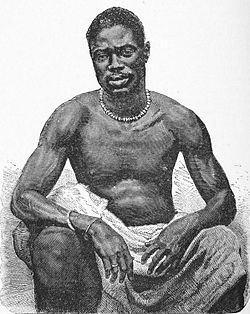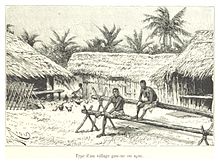Human arrival in Ivory Coast has been dated to the Upper Paleolithic period, or at the minimum, the Neolithic period based on weapon and tool fragments, specifically polished shale axes and remnants of cooking and fishing. The earliest known inhabitants of Côte d'Ivoire left traces scattered throughout the territory. Historians believe these people were all either displaced or absorbed by the ancestors of the present inhabitants. Peoples who arrived before the 16th century include the Ehotilé (Aboisso), Kotrowou (Fresco), Zéhiri, Ega, and Diès (Divo).

Ivory Coast, also known as Côte d'Ivoire and officially the Republic of Côte d'Ivoire, is a country on the southern coast of West Africa. Its capital city of Yamoussoukro is located in the centre of the country, while its largest city and economic centre is the port city of Abidjan. It borders Guinea to the northwest, Liberia to the west, Mali to the northwest, Burkina Faso to the northeast, Ghana to the east, and the Atlantic Ocean's Gulf of Guinea to the south. With 30.9 million inhabitants in 2023, Ivory Coast is the third-most populous country in West Africa. Its official language is French, and indigenous languages are also widely used, including Bété, Baoulé, Dioula, Dan, Anyin, and Cebaara Senufo. In total, there are around 78 different languages spoken in Ivory Coast. The country has a religiously diverse population, including numerous followers of Islam, Christianity, and traditional faiths often entailing animism.
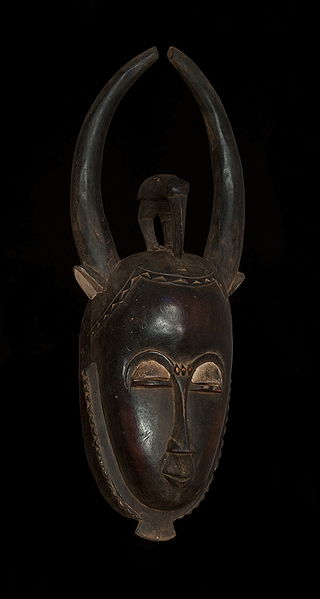
The Baule or Baoulé are a Akan people and one of the largest ethnicities in Côte d'Ivoire. The Baoulé are traditionally farmers who live in the centre of Côte d'Ivoire, in a French braid shaped region between the rivers Bandama and N'Zi. This area broadly encompasses the regions around the cities of Bouaké and Yamoussoukro. The Baoulé have come to play a relatively important role in the recent history of Côte d'Ivoire: the state's first president, Félix Houphouët-Boigny, was a Baoulé; additionally, since the Ivorian cocoa boom of the 1960-1970s, the Baoulé have also become one of the most widespread ethnicities throughout the country, especially in the Southern forests where they are amongst the most numerous planters of cocoa, rubber, and coffee and sometimes seem to outnumber the local native ethnic groups.
The Dyula are a Mande ethnic group inhabiting several West African countries, including Mali, Côte d'Ivoire, Ghana, and Burkina Faso.
The Akan people are a Kwa group living primarily in present-day Ghana and in parts of Ivory Coast and Togo in West Africa. The Akan speak dialects within the Central Tano branch of the Potou–Tano subfamily of the Niger–Congo family. Subgroups of the Akan people include: the Agona, Akuapem, Akwamu, Akyem, Anyi, Ashanti, Baoulé, Bono, Chakosi, Fante, Kwahu, Sefwi, Wassa, Ahanta, and Nzema, among others. The Akan subgroups all have cultural attributes in common; most notably the tracing of royal matrilineal descent in the inheritance of property, and for succession to high political office. All Akans are considered royals in status, but not all are in royal succession or hold titles.
The diverse culture of Ivory Coast, a coastal West African country bordered by Ghana, Liberia, Mali, Burkina Faso, and Guinea, is exemplified by a multitude of ethnic groups, events, festivals, music, and art.
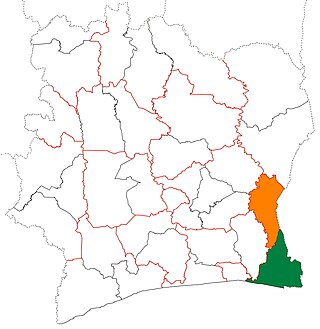
Sud-Comoé Region is one of the 31 regions of Ivory Coast. Since 2011, it has been one of two regions in Comoé District. The region's seat is Aboisso. The region's area is 7,240 km2, and its population in the 2021 census was 784,893.
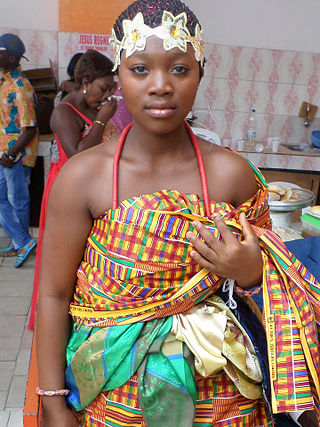
The Bono, also called the Brong and the Abron, are an Akan people of West Africa. Bonos are normally tagged Akan piesie or Akandifo of which Akan is a derivative name. Bono is the genesis and cradle of Akans. Bono is one of the largest ethnic group of Akan and are matrilineal people. Bono people speak the Bono Twi of Akan language. Twi language, thus the dialect of Bono is a derivative of a Bono King Nana Twi. In the late fifteenth century, the Bono people founded the Gyaaman kingdom as extension of Bono state in what is now Ghana and Côte d'Ivoire.
Abengourou is a city in eastern Côte d'Ivoire. It is the seat of both Comoé District and Indénié-Djuablin Region. It is also a commune and the seat of and a sub-prefecture of Abengourou Department.

Aboisso is a town in south-eastern Ivory Coast lying on the Soumié River. It is a sub-prefecture of the Aboisso Department for which it is also the seat of government. Aboisso is also a commune as well as the seat of government for the Sud-Comoé Region in Comoé District.
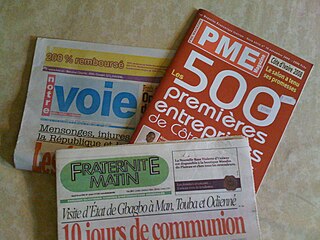
Ivory Coast is a multilingual country with an estimated 69 languages currently spoken. The official language, French, was introduced during the colonial period. This language is taught in schools and serves as a lingua franca in the country, along with Dioula.

The Asante Empire, also known as the Ashanti Empire, was an Akan state that lasted from 1701 to 1901, in what is now modern-day Ghana. It expanded from the Ashanti Region to include most of Ghana and also parts of Ivory Coast and Togo. Due to the empire's military prowess, wealth, architecture, sophisticated hierarchy and culture, the Asante Empire has been extensively studied and has more historic records written by European, primarily British, authors than any other indigenous culture of sub-Saharan Africa.

Religion in Ivory Coast is diverse, with no particular religion representing the majority of the population. According to the 2021 census, Islam is professed by 42.5% of the total population, while adherents of Christianity represented 39.8% of the population. In addition, 12.6% of Ivorians reported to be non-religious and 2.2% claimed to follow Animism or traditional faiths. Between the 2014 and 2021 censuses, the share of Christians increased from 33.9 to 39.8 percent, while the share of Muslims declined from 42.9 to 42.5 percent of the total population.
Akoboissué is a town in eastern Ivory Coast. It is a sub-prefecture of Agnibilékrou Department in Indénié-Djuablin Region, Comoé District. Ten kilometres east of town is a border crossing with Ghana.
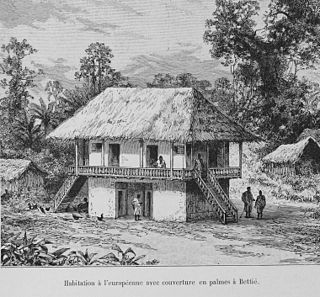
Bettié is a town in south-eastern Ivory Coast. It is a sub-prefecture of and seat of Bettié Department in Indénié-Djuablin Region, Comoé District. Bettié is also a commune. The town lies on the east bank of the river that forms the boundary between Comoé and Lagunes Districts. In 2014, the population of the sub-prefecture of Bettié was 24,983.
Krindjabo is a village in south-eastern Ivory Coast. It is in the sub-prefecture of Aboisso, Aboisso Department, Sud-Comoé Region, Comoé District.

Akan religion comprises the traditional beliefs and religious practices of the Akan people of Ghana and eastern Ivory Coast. Akan religion is referred to as Akom. Although most Akan people have identified as Christians since the early 20th century, Akan religion remains practiced by some and is often syncretized with Christianity. The Akan have many subgroups, so the religion varies greatly by region and subgroup. Similar to other traditional religions of West and Central Africa such as West African Vodun, Yoruba religion, or Odinani, Akan cosmology consists of a senior god who generally does not interact with humans and many gods who assist humans.
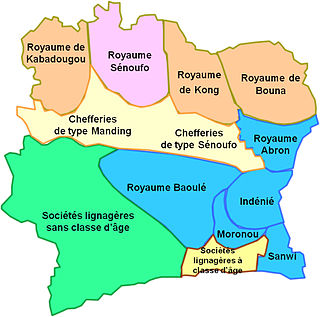
The Kingdom of Sanwi is a kingdom located in the south-east corner of the Republic of Ivory Coast in West Africa.
The Abbé, are an Akan people who live predominantly in the Ivory Coast, and number 580,000. Abbés speak the Akan dialect Abé.

Ivorian nationality law is regulated by the Constitution of Ivory Coast, as amended; the Ivorian Nationality Code, and its revisions; and various international agreements to which the country is a signatory. These laws determine who is, or is eligible to be, a national of Ivory Coast. The legal means to acquire nationality, formal legal membership in a nation, differ from the domestic relationship of rights and obligations between a national and the nation, known as citizenship. Nationality describes the relationship of an individual to the state under international law, whereas citizenship is the domestic relationship of an individual within the nation. Ivorian nationality is typically obtained under the principle of jus soli, i.e. by birth in Ivory Coast, or jus sanguinis, i.e. by birth in Ivory Coast or abroad to parents with Ivorian nationality. It can be granted to persons with an affiliation to the country, or to a permanent resident who has lived in the country for a given period of time through naturalization.
